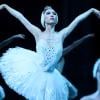
What young musician wouldn’t jump at the chance to work with members of the Los Angeles Philharmonic and its music and artistic director, Gustavo Dudamel? For the participants of the Encuentros Orchestra (the name means “encounters”), it’s decidedly a dream come true. Indeed, on Aug. 2, more than 100 top-tier young musicians, ages 18 to 26, from the Americas and around the world, representing 34 youth orchestras and El Sistema-inspired programs in 22 countries, come together to perform on the stage of the famed Hollywood Bowl. (Tickets are available here.)
As part of a two-week orchestral training festival, the youths will also participate in community initiatives, mentorship opportunities with the YOLA National Festival, and projects throughout Los Angeles, culminating in the Bowl appearance, which will then be followed by an Aug. 4 concert at Berkeley’s Greek Theatre, presented by Cal Performances.
The program, which celebrates the next generation of arts leaders, promises to be memorable. On tap are the world premiere of Giancarlo Castro D’Addona’s Encuentro Obertura Festiva and Wayne Shorter’s Gaia (both LA Phil commissions), the latter also featuring double bassist/vocalist Esperanza Spalding, guitarist Matthew Stevens, drummer Eric Doob, and pianist Darrell Grant. To top things off, Dudamel will lead the band in Dvořák’s Symphony No. 9, “From the New World.”
With his plate generally overflowing, Dudamel managed to find time to create what he called the “idea of Encuentros in 2018”: a global music education program. Under his direction and leadership, and through his foundation (with his wife and co-chair, María Valverde), Encuentros, the maestro said in a statement on the Hollywood Bowl website, “is a way to explore cultural unity and celebrate the concepts of harmony, equality, dignity, beauty, and respect through music, with the goal of inspiring and teaching a new generation of young leaders to work toward building a better world.”
Elsje Kibler-Vermaas is vice president of learning for the LA Phil and oversees all learning initiatives, including YOLA (Youth Orchestra Los Angeles) and YOLA National. She explained that this is the first time the Dudamel Foundation will be hosted in the States. “Last year it was in Spain, where we had close to 60 musicians. This year, we’re able to bring in larger numbers, and when they arrive in L.A., they’ll all get to know each other before the concert when they’ll become an orchestra. The performance on Aug. 2 will be the first time they’re performing together.

“What’s important to note,” added Kibler-Vermaas, “is that the musicians don’t come in cold. I’ve been seeing video evidence, and we saw some of our Venezuelan colleagues who were waiting for their visas were also rehearsing the repertory. They’re all coming prepared, and it’s a lot of intensive repertory, but they’re as ready as they can be.”
Then there’s the Dudamel factor: Kibler-Vermaas pointed out that the fiendishly busy conductor also brought on board “an amazing faculty — a lot of principal players from the LA Phil, the Berlin Philharmonic, and the Gothenburg Symphony to be working in sections when they’re not in full orchestral rehearsal. María [Valverde] has also organized a series of workshops focused on leadership, wellness, and cultural exchange, so it’s a well-rounded experience.”
While the musicians are rehearsing at the YOLA Center, Disney Hall, and the Bowl and getting to know each other in the process, Venezuelan-born composer Castro D’Addona has had a lifelong friendship with Dudamel. The two met in the early 1990s when they came up through El Sistema together.
“We were around 10 or 11 years old,” wrote Castro D’Addona in an email. “We grew up in the same town, taking the same music classes and playing in the same orchestras, and even went together with other friends to the movies, malls, parties, and birthday celebrations. We also played in the National Youth Orchestra of Venezuela, [where] we were roommates. He became a conductor, and I was able to be conducted [on trumpet] by him in the Simón Bolívar Orchestra for many years.”

Their bond continued, and Castro D’Addona, who currently lives in Portland, Oregon, working as a conductor at Metropolitan Youth Symphony and at the Portland Youth Philharmonic at Reed College, received his first commission from YOLA, aptly dubbed YOLA Fiesta Fanfare. The LA Phil then asked him to compose a work for the Bowl celebration, and Encuentro Obertura Festiva was born.
The nine-minute piece, threaded with fanfares and film-music elements, features a huge brass section, a number of woodwinds, percussion, harp, and a large string section. Castro D’Addona said that he considers it “a very emotional moment in my career.”
So, too, does Kibler-Vermaas understand the significance of the concert. “I look at it,” she declared, “as the music Olympics. We’re excited this year when we are celebrating the 100-year anniversary of the Bowl, and I’m honored that we get to be part of it.”




